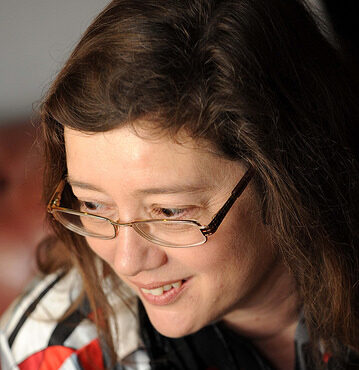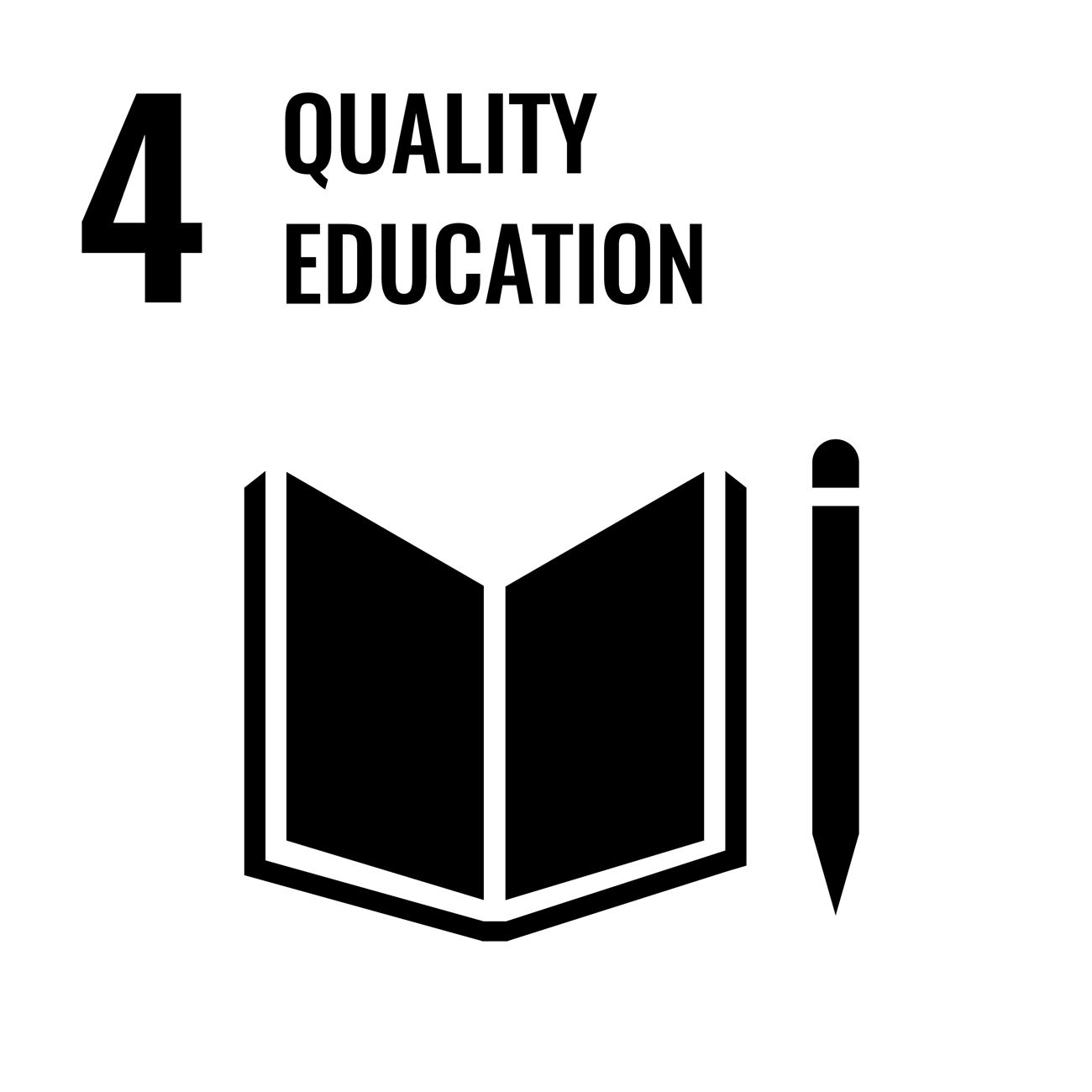#Chair
Chair in New Media Forms of the Book
University of Bedfordshire – Professor Alexis Weedon
Home > Expert Network > Chairs
Storytelling shapes the way we experience the world and advances human knowledge, but that’s only if everyone listens.
The thoughts and ideas that change humanity, by breaking down assumptions, barriers and prejudices, are co-created between individuals and communities. Although these stories advance development, western book publishing systems do not support such co-creation of knowledge between writer and reader. The University of Bedfordshire’s Chair in New Media Forms of the Book is responding to this need for a platform to share all stories, by changing publishing practices and widening humanity’s access to knowledge.

#ChairThemes
? Culture
? Literacy
? Education
#RelatedChair
UNESCO Chair in Reading
Pontifícia Universidade Católica do Rio de Janeiro
#SDG
QUOTE
“We must always listen out for the stories that are not being heard. No voices should be lost.”
Professor Alexis Weedon
UNESCO Chairs are based within Institutes for Higher Education and specialise in specific research fields. They provide policy advice to the UK National Commission for UNESCO and HM government, as well as reviewing UNESCO applications.
ABOUT THE CHAIR
Professor Alexis Weedon leads a diverse programme of projects, publications and events that examine how forms of collaborative authorship can break down assumptions and change publishing practices.
Drawing comparisons between fairy tales retold in different countries, this research-led programme has evaluated the importance of storytelling in a shifting society. As globalization brings pervasive, branded identities to different cultures, fairy tales such as Cinderella and Robin Hood often manifest themselves as stories of a person transforming their society. Through this onslaught of new media there has been increasing in the displacement of local and indigenous creative authorship.
Her team works with researchers, artists, writers, SMEs and policymakers to broaden global access to knowledge. Storytelling is a powerful method of communicating ideas that requires a range of cultural literacies and skills. From oral retelling and visual communication, to digital literacy and knowledge of IT, however they are told, stories inspire change across generations and actively combat injustice.
ABOUT THE CHAIR’S RESEARCH
Having worked with partners across hugely diverse industries, Alexis works to bridge gaps in understanding and unite people through storytelling via innovative formats. With the Cinderella Project, for example, Professor Weedon and colleagues worked to identify and retrace it’s retellings throughout different countries and cultures. As it has become humanity’s shorthand for the unexpected success of the disregarded, Alexis explores how a story can be appropriated and reinterpreted to articulate how social and family relationships are adapting to modern society. Men as well as women, companies as well as people.
Sherwood Rise: A Transmedia Story Experiment.
The Robin Hood legend is often mistaken as a clear-cut discussion about the divide between rich and poor, yet the main character remains wholly ambiguous. Whether good, bad or evil, Robin’s ambiguity gave Professor Weedon the opportunity to tell one story from multiple perspectives and through different voices. Her version of the story, Sherwood Rise, is told through a range of media including printed newspapers, emails, hacker websites, sound, music and smartphone AR.

Professor Alexis Weedon
Professor Weedon’s expertise lies at the centre of transmedia storytelling and new forms of the book, literary production and publishing. As a Research Professor of Publishing, she is currently exploring the origins of transmedia storytelling in the 1920s and 1930s more specifically. She is the Director of the Society for the History of Authorship, Publishing and Reading, and her research in new media forms of the book explores how they should no longer be defined as pages bound together: instead they are entitled to take any shape that simply tells a story. This means Alexis’ work ranges from ‘Books as Media’, a chapter in the Cambridge History of the Book: The Twentieth Century, to augmented reality and digital innovation.
#Institution
University of Bedfordshire
Professor of Publishing
SINCE 2005
#Alma-Mater
University of Oxford
DPhil.
#Role at UNESCO
UNESCO Chair in New Media Forms of the Book
SINCE 2012
#Research&Events
LATEST EVENTS AND RESEARCH PROJECTS
Read about some of the many projects that Professor Weedon has been a part of, alongside her team.

Sherwood Rise
#NewMedia
A retelling of the classic, Robin Hood, through a combination of digital and physical media. Designed by David Miller and written by David Moorhead, here the vision of one story and many books is realised.
Publications
SELECTED PUBLISHED WORK
New Media is defined as any form of media that emerged in the late 20th and early 21st century. Read more about the work that Alexis has carried out in this field, below.

Towards safeguarding Creole intangible cultural heritage.
2018
#IndigenousCulture
Alexis delivers a keynote at the Creole Fest: Building Bridges Across Borders Symposium on 10 November 2018.
LATEST
QUOTE
“I love to hear people’s stories and how they tell them. We all change our stories as our needs change and we use them to reform ourselves, our society and culture.”
Professor Alexis Weedon
#MeetTheChairs
RELATED CHAIRS
#Culture #NewMedia

Chair in Refugee Integration through Languages and the Arts
UNIVERSITY OF GLASGOW
Prof. Alison Phipps #Education
Led by Professor Alison Phipps, the Chair’s team of six is pioneering a series of research projects, residencies and events which place language and the arts at the heart of refugee integration.

Chair in Media Freedom, Journalism Safety and the Issue of Impunity
UNIVERSITY OF SHEFFIELD
Prof. Jackie Harrison #Media
The Chair supports the international agenda to safeguard media. They prevent, protect and prosecute crimes against journalists through a combination of high-quality research, teaching and informed advocacy.
ALL UK CHAIRS
Meet the rest of the UK Chairs.
Led by Professor John Shawe-Taylor, the Chair’s team is developing a series of research projects delivering AI that can improve health and education, reduce inequality, and spur economic growth
The Centre for Shared education, led by Professor Joanne Hughes at Queen’s University, advocates shared education as a model for promoting inter-relations through education.
Storytelling shapes the way we experience the world and advances human knowledge, but that’s only if everyone listens.
Data has been called the gold of the 21st Century and advanced data analytics techniques have the potential to revolutionise almost every aspect of human activity.
[mapsvg id=”12506″]
JOIN THE NETWORK
Are you interested in becoming a UNESCO UK Expert or Chair? Find out more below
#MoreExperts
RELATED ACCREDITED EXPERTS
Meet the UK National Commission for UNESCO Accredited Experts
#Culture #Literacy

David Wilson
ACCREDITED EXPERT
#CreativeVoices
As an Expert advisor to the UKNC to UNESCO on the development of creative cities across the world, David Wilson works to drive sustainable development through culture and creativity.
FULL LIST
A global network of universities that carry out research to address pressing challenges and contribute.
*by alphabetical order
Our advisors are experts in their field who provide advice to the UK National Commission for UNESCO by reviewing applications for UNESCO designations, prizes and patronage, and contribute to other aspects of our work.
All our accredited experts are selected to advise the UK National Commission for UNESCO on policy matters related to UNESCO. They are approved by HM government to represent the UK in UNESCO committees, commissions and programmes.
#IHP #Science
#IPDC #Communication
#IHP #Science
#IOC #Science
#IOC #Science
#Bioethics #Social&HumanScience
#Biosphere #RuralBritain
#SESAME #Science
#CreativeCities #FilmLiteracy
#CreativeCities #Libraries
#Geoparks #Sustainability
Liaising with the UK’s Permanent Delegation to UNESCO and approved by HM government, our Non-Executive Directors help steer the direction of the UK National Commission for UNESCO, and are each responsible for overseeing a particular field of UNESCO’s work in the UK.
#Chair #HumanSciences
#Vice-Chair #Culture
#Communication&Information
#NaturalSciences
#HigherEducation
#Education
EXPLORE FURTHER
Our ? Accredited Experts are one of four pillars that form the structure for our ?️ Expert Network. Meet our ? Chairs, our ? Advisors, and our ? Non-Executive Directors
click on the links above
PREVIOUS
Chair in Inclusive and Quality Education for All at the University of Bristol.
#Chair Prof. Leon Tikly
NEXT
Chair in Refugee Integration through Languages and the Arts at the University of Glasgow.
#Chair Prof. Alison Phipps











